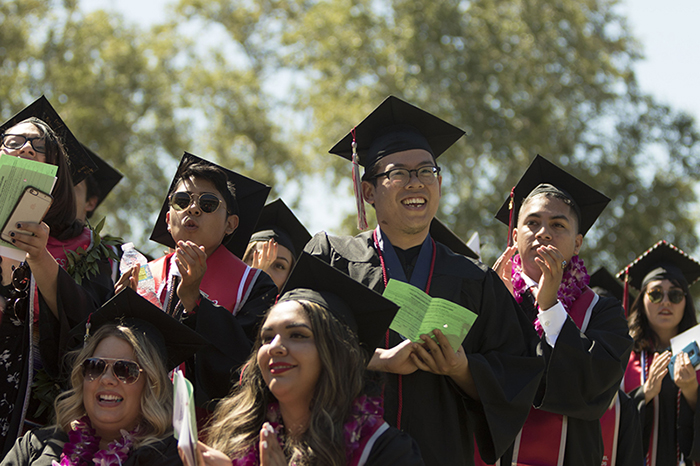 Dec. 12, 2017 — CSU Channel Islands (CSUCI) is among the top 20 colleges and universities in the nation in terms of social mobility, a term synonymous with a low income students being able to improve their socioeconomic circumstances.
Dec. 12, 2017 — CSU Channel Islands (CSUCI) is among the top 20 colleges and universities in the nation in terms of social mobility, a term synonymous with a low income students being able to improve their socioeconomic circumstances.
CSUCI is ranked number 18 out of 1,363 universities in the “Social Mobility Index” (SMI), which was developed by CollegeNET — a software company for higher education, and PayScale, Inc. an online salary, benefits and compensation information company.
The SMI measures the extent to which a college or university educates more economically-disadvantaged students at a lower tuition rate, then graduates them into promising careers.
CSUCI Executive Director of Student Academic Success & Equity Initiatives Amanda Quintero, Ph.D. believes CSUCI excels at social mobility because the University takes special care to provide encouragement, tutoring and practical support to students and families who may not be familiar with the college experience.
“This recognition made me feel very proud of the work we’ve been doing,” Quintero said. “For a long time, I’ve been applying for funding available to Hispanic Serving Institutions (HSIs). Some of the criteria is that we have a minimum of 30 percent of students receiving Pell Grants. Over time, that number has skyrocketed to about 50 percent. Nearly half come from under-resourced communities and about 60 percent are the first in their families on a pathway to completing a baccalaureate degree.”
In fact, all 23 CSU campuses appeared in the top quartile of the listings, with five CSU campuses in the overall top ten.
Data was collected through third-party sources such as Payscale, Inc. and the Integrated Postsecondary Education Data System. The index measured five criteria when compiling statistics: tuition cost; the percentage of the student body from low-income households; graduation rates; and the size of a school’s endowment.
Quintero often works with students who are the first in their family to attend college, and these students are often from lower socioeconomic backgrounds reaping the greatest benefit from higher education as a tool for social mobility.
Quintero herself is the picture of social mobility. She rose from poverty to become the first of her family to attend college, ultimately earning a Ph.D. in Education from Claremont Graduate University.
“It was really tough. It was a hard, hard road,” she said. “I worked full time the entire time I was on this path. I had to work two or three jobs in order to go to school. At times it was very lonely.”
But in the end, she said, the sacrifice was more than worth it because she improved circumstances for her entire family, and for generations ahead.
Her advice to those who are seeking an education despite few economic resources is to “never give up,” she said.
“It’s not always going to be easy. Ultimately the sacrifice they’re making is going to change the trajectory of their family forevermore,” she said. “This is something much bigger than themselves.”
